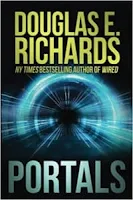“Portals” by Douglas E. Richards – The Bane of Being Human
Short Summary
Douglas E. Richards is one of the few authors with the remarkable talent of being able to pull the reader into his outlandish concepts and have them turning one page after the next, and Portals is a perfect example of that. It follows the story of Noah Harris and Ashley Finn, two field agents for an organization meant to protect humanity from itself, and the only ones standing between Earth and its invasion by humans from a different planet, connected by a mysterious portal.
Douglas E. Richards Creates an Intergalactic Mystery
Long have we dreamed of discovering what other planets and galaxies hold in store for us. From awesome and unimaginable flora to fully-fledged aliens ready to share their superior technology, we've probably gone through all the possible scenarios time and time again in our own heads. However, as the characters in Portals by Douglas E. Richards find out, what awaits them beyond the cosmic veil is more surprising than anything they've anticipated.
The novel starts by making the necessary introductions, allowing us to meet Noah Harris and Ashley Flynn, two field agents working for an absurdly-powerful organization. Their objective is to protect humanity from itself, to stop it from misusing powerful technologies and wreaking havoc on the world around them, something they're already good enough at.
One day, a life-changing discovery is made: there are portals to numerous planets, likely built by some ancient and transcendent beings for reasons nobody can really fathom. On the other side of those portals, they make a discovery simultaneously amazing and terrifying: they meet other human beings just like themselves.
Naturally, various questions begin to arise about this unusual state of affairs. Why do they only encounter humans exactly like those on Earth? How and when did they get there? Is there some greater plan at work they are unable to see? Can those other humans be trusted, or at they, for lack of better terms, just like us?
While some of those planets don't exactly seem threatening, Earth's nearest neighbours are showing some alarming signs. Having already conquered their own world, the appearance of Earth on their radar has given them a juicy new target for conquest, and they have a devious plan to make it all happen. Severely outmatched, but perhaps not outwitted, Noah and Ashley rise up to defend their planet, hoping to unravel the mystery at the centre of it all before it's too late.
Feet Anchored in Reality in Portals
If you've been reading the genre for a while now, then you'll know that science-fiction books come in many shapes and sizes, appealing to different tastes based on the approach their authors take. While some people understandably simply read novels for entertainment, others are looking for something a little more substantial and educative, which, in my opinion, is the category Portals by Douglas E. Richards falls into.
It's a hard science-fiction book, and the author's insistence on discussing our current knowledge in the realms of physics and astronomy is more than enough to earn that classification. Indeed, there are numerous moments throughout the book where the action and thrills (more on this aspect later on) take a back-seat in favour of exploring the realistic side of the equation.
There is one aspect to this book which I think might divide readers a fair bit, and it's the author's insistence on explaining the existence of the titular portals, to craft theories explaining them in a believable manner. While I can see how some would find the action pointless, especially in a fiction book, I rather enjoyed the various theories he came up with, if only for the intellectual exercise they provide.
While he does spend a bit too much time focusing on the scientific aspects in some spots, on the whole, I think the author succeeded in erecting a down-to-Earth foundation on which to build his story. He defines the rules of the game quite clearly, adeptly avoiding the one pitfall I despise in science-fiction stories: a set of internal laws (or lack thereof) allowing pretty much anything to happen. Not everything is possible in Portals, giving the author little chance of pulling some Deus ex machina out of nowhere.
While this deeper foray into the scientific principles governing the universe of Portals does leave less room for developing the plot and moving it forward, it doesn't mean the story is boring by any stretch of the imagination. Richards has an excellent understanding of pacing, and how to use it in order to make the book entertaining as a whole until the very end.
Technological Downfall
One of the main themes which I see persisting throughout Portals is just how over-reliant human beings have become on technology, and how pushing the boundaries of what it can do promises to spell doom or us all. With great discoveries the potential for both immense good and destruction is born, and needless to say, I think we all know which of the two humans are prone to fulfill.
Through Portals, Douglas E. Richards takes the opportunity to examine humanity from a different and unique enough angle: an alternate mirroring of our civilization. While I think we all know just how cruel and wantonly calamitous human beings can be as whole, seeing it from the other side serves as a stern reminder that hopefully we will never meet a technologically-inferior civilization to ours.
Richards does take the opportunity to rant about the modern world time and time again, and while his arguments are certainly well thought-out and difficult to disagree with, I personally thought they took a little too much space, especially for a novel with so much ground to cover. However, you might certainly disagree with me, and on the whole I wouldn't say it ruined my enjoyment of the book.
As for the actual adventure of the book, Noah and Ashley have their work cut out for them, having to solve both the mystery of the portals and those behind them, as well as the devious plan our neighbouring humans are putting into motion. Watching them race against time from one discovery to the next is, more often than not, pulse-pounding and captivating, and that's without even mentioning the surprising number of action scenes the author managed to cram into the story.
I was happy to see that the further I got into the book, the more the author began to prioritize the main plot, and while the path to its resolution is fairly winding and a little complex at certain junctions, it does end in truly satisfying and memorable fashion. It wraps up all the necessary plot threads, and leaves you with enough food for thought until you dig into a new book.
The Final Verdict
Portals by Douglas E. Richards is an excellent hard science-fiction story where the author successfully builds a unique and mysterious plot on a solid and realistic scientific foundation, complete with thought-provoking social commentary, even if it does drag on a tad at times.
If you're a fan of Douglas E. Richards' style and other works, or are simply searching for the sort of hard sci-fi story which also doubles as a galactic mystery thriller, then I don't think you could go wrong with this book.
 | Douglas E. RichardsPersonal site Douglas E. Richards is an American writer focusing primarily on the field of science-fiction, as well as dabbling in literature for children and young adults from time to time. Some of his more acclaimed works include WIRED and AMPED of the Wired Series, The Cure, Oracle and Unidentified. |








Comments
Post a Comment